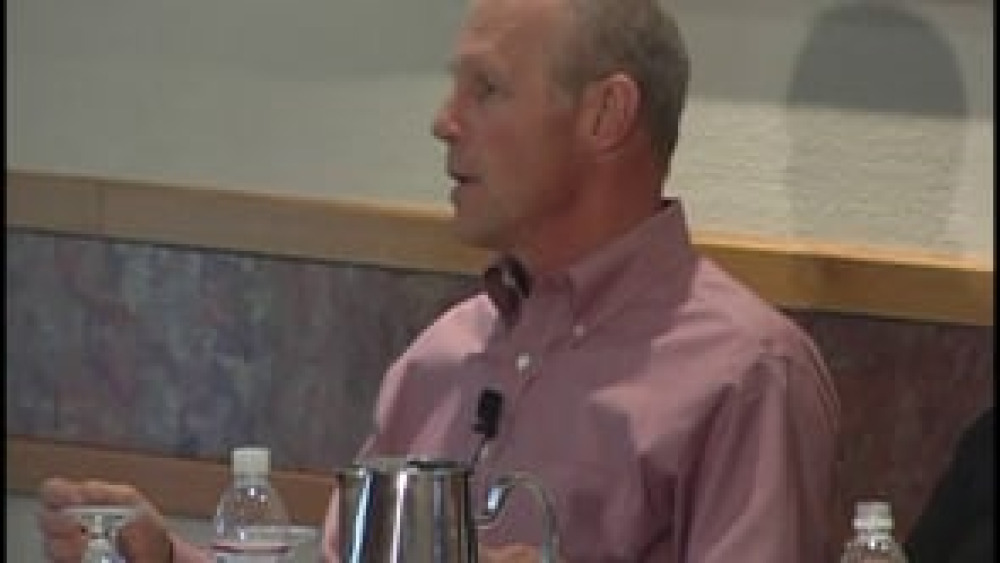Native Nations Institute Executive Director Joan Timeche shares her experiences as a board member on two tribal economic development corporations, and identifies some key things that Native nations need to consider as they work to craft effective approaches to corporate governance.
Additional Information
Timeche, Joan. "The Practical Issues of Business Development - Some Things to Consider: Governing Body." Building and Sustaining Tribal Enterprises seminar. Native Nations Institute for Leadership, Management, and Policy, Udall Center for Studies in Public Policy, University of Arizona. Tucson, Arizona. March 29, 2007. Presentation.
Transcript
"I serve on two tribal corporations. One of them is a Section 17. It's the Hopi Tribe's Economic Development Corporation and we were much like Joe [Kalt] described. We went out and we bought businesses and started businesses and then had them running. They were the council-run model and then they established a new corporation, which they transferred all of those businesses over to us. So it's been a very challenging task for us. And then the other board that I sit on is with the Tohono O'odham Nation, which is just adjacent, an hour to the west of Tucson here. And they were structured very much like the Ho-Chunk, Inc. model that we put on your CD where they are a separated model. They got a large dollar, $10 million to start up their corporation, but all of their control is at the local level in their districts, political districts. So despite the fact that they have millions of acres of land for development, it's very difficult and we have yet to secure any land at all for our corporation development. So we also have many of these challenges.
I'm going to talk about these governing bodies because they are a very important key to moving forward. Basically when you look in terms of governing bodies, what we're looking at is whatever is specified in your charter. And today we heard many models of those. They're in a board of directors, but that board of directors may be the tribal council as we heard. They could be the business committee. And all of their duties and powers are defined in those charters. And you'll see some examples on that CD of the several that we gathered. They range the whole gamut from where you have minimal kinds of powers to ones where you end up having to have thresholds where at certain levels -- maybe it's purchases, maybe it's land, or whether the case may be -- it has to go back to council. So that can be all specified in there. But their whole job, this governing body -- whether it's a separate board, whether it's the business committee of the council, whatever it may be -- are responsible for the overall management of these businesses and the activities of them.
So let's talk a little bit about this board and how it should be organized. And some of the things you have to take, and these are all no-brainer stuff, I'm just going to cover examples of them. The composition: how many directors do we have? And of course you know that everyone tells you, you need to have an odd number. Five, seven, nine -- those seem to be common numbers. I sit on one that's seven but I prefer a five-member board because when you get down to the real logistics of trying to get to meetings and quorums, there's real practicality in getting, it's much easier to get three members together rather than five for a quorum.
Length, terms -- these are again all specified. One of the things that we would encourage you to do is when you're setting up these corporate terms that they not coincide with council election terms, because then it's seen that all you're doing is it's a political appointment and political elections. So you want to make sure that they're off, the terms are different than council's terms whether they're two-, three-year or four-. And just as we found in council terms, our research has indicated that the longer the terms are the more consistent stability, consistency you have and there's a more stable environment there too so we encourage you consider moving towards a longer term.
Qualifications: you heard [Salt River Pima Maricopa Indian Community] President [Diane] Enos talk this morning about the composition of her boards and you heard that from some of our panelists this morning about having the expertise of the people. And President Enos, she indicated that they always have somebody from the industry that sits on these boards. And this is something that we're seeing is increasingly common with some of the corporations that we work with. Where it's not just tribal citizens that are composing the board. It is combinations where you have some citizens -- and they might constitute the majority of those members or they can constitute a minority of it -- but you have to have these qualifications. In both the Hopi and the Tohono O'odham corporation charters, they require that all, well, Hopi requires that all of its members have successful business experience; that's the minimum criteria for that position. In the Tohono O'odham [charter], it specifies a certain number of people that have to be from a business field, who have had business experience or either have a profession in that area. So you can set up those criteria to meet the needs that you might have.
And again, back to this, I started talking about this, about the independent members. On the Tohono O'odham Nation for example, they have a seven-member board. Five of those members have to be citizens of that nation and they have two that can be non-tribal citizen members. I happen to be in one of those seats that is a non-tribal member sitting on that board. And one of the things that I have been able to find, just from my own personal experience, has been that I can say a lot of things that perhaps they can't say because I'm looking at them from the outside in. Sometimes because they know each other politically, it's a little bit more difficult for them to be realistic and to say what they might be thinking, but I can say those kinds of things from the outside. So that's one of the benefits to it. Sometimes they don't always like me saying what I do say, but I try to say it in a way that benefits the corporation overall.
The other question that also gets raised all the time is, ‘Can employees be eligible for these board seats?' And I'm talking about tribal government employees. Should they be eligible or not? This is a decision that you will end up having to make. Can an elected official be on this board? Some tribes will define elected official very broadly so that, I even know of one tribe where even if you sit on the school board, the public school board where you've been elected to a seat, you're defined as a public official so you cannot be a member on that board. So those are all considerations you have to take into place.
Then comes the big question -- council members. Can a council member sit on the board or not? When you open up Ho-Chunk, Inc.'s charter, you're going to find that it states that two members of their board should be from the governing body, the tribal council. There's pros and cons to it. We can argue about this all day but basically, I believe, I think it was [Meadow Lake Tribal Council] Chief [Helen] Ben who mentioned earlier about the competing interest that you have. If the chief is sitting on the board, are they wearing their chief hat? Are they wearing their employee hat? Or are they wearing their citizen hat? Are they wearing another hat of some sort? And it gets... there's a real fine line there, so it gets really difficult. But basically we found that it's just really difficult to keep those political considerations out of any kind of enterprise decision.
The other considerations that you need to make sure you have are sections that define how individual board members can be removed. Is this something that, do they serve at the pleasure of the council? Does the chief executive, the chairman, the president, the chief have the authority to remove these individuals? What is the process for removing them? Because this becomes very, a big issue as well as you move forward. Resignations, how do you fill vacancies? Does it have to go back to the council? Can the board itself then be able to fill these slots in the interim until the next council, maybe perhaps until the term expires? These are all things that need to be spelled out in procedures to move forward here.
Vacancies: one of the things that can be done is sometimes vacancies can be that blessing in disguise because it allows the board to take a look at themselves and determine, ‘Okay, who's sitting on our board? What skills, what talents, what areas are represented? Maybe we need to have...' I'll just take Hopi's development corporation. We have two vacancies. One of our vacancies was a person who knew the hotel and restaurant industries. Well, we have two hotels and two restaurants to run. Now we're lacking that kind of knowledge base on our board, and for us it's critical to find someone in there. We have three huge ranches. We don't have anybody with a ranching background. So for us that kind of a person is critical for us to find to fill that kind of a seat because the rest of us may know business in general because three of us have MBAs, but we know business concepts in general but we don't know the industry specifically.
So those are things that you can take a look at and you'll see some of the ideas up there that have worked for other entities. They're all ones that you can take a look at. The following slide is just basically a matrix that you can utilize to do this analysis of what is your board [consist of]? Each individual member: now this is all...one of the things I always encourage people to do is each individual member of the board fill this out for themselves and how they view each other and then hopefully the relationships within the board is one where they can be open and frank and honest with each other and that they don't take any of these -- if there was a negative answer on there -- that they would not take it personally because it's all being done in a constructive manner to be able to improve the board.
In terms of who selects or appoints the board, the shareholder has generally all of those responsibilities. I've seen... I don't know of any right off the top of my head where it's delegated to another entity. And the shareholder in many cases is the governing body of the nation who is the tribal council in many options. And sometimes the shareholder may decide, 'Okay, we're going to start on this new enterprise and we're going to appoint you, you and you to be on this board.' It can be done and I've seen it done that way. Or they can say, 'We're going to go through a formal nomination process,' and they advertise, they put it out and so on. And there's processes to follow, which I'll cover in the next slide. Or there can be an application process where it's much like a job. Whatever the case may be, you're going to want to make sure that you do have the information that you need on each of these potential board members because you're entrusting them with major responsibilities and sometimes just like a council they are making multi-million dollar decisions, the kinds of decisions that end up having to have long-term impact on not just the nation but its future as a whole. So these are very important.
The next slide just gives you some examples, and some of the ones that are real common or what I call standard. Most people will advertise, they ask for a letter of interest and a resume. Sometimes they'll do a reference chart, sometimes they won't. Hopi, look at Hopi's example here. This is what's happening now, but when we got acquainted we were under that first one, the first initial board of directors, we were just asked to submit a letter of interest and nobody even interviewed us and it wasn't until quite some time afterward that we were required to undergo an extensive background check. I think that background checks are going to be very critical, because again financial institutions are going to look at the composition of the board, can these people make sound decisions, these people have been running businesses but they've bankrupted each time, these are all very important kinds of things to take a look at. The Tohono O'odham Nation probably has one of the most comprehensive processes for recruiting or filling these four vacancies and I included a sample of their last announcement on that CD. I had to go through three interviews, two of them at the legislative committee level, and I first saw my first background check. I couldn't believe how extensive it was. It was just totally unbelievable. I passed. I had to go to a formal interview for the council. It was very much like a job. I was basically applying for the job of being on this board. I was asked business questions. Do I know what a business plan consists of? It was very much like a job and they screened them very well and I thought that that was one of the things that has helped me contribute to make the board much more powerful and helping us to be on the same page as we move forward in making some of these decisions.
Just a couple of other slides -- that you're making sure that you have these people and sometimes you can get these people to join your board: the banker, maybe a professor, you think of marketing people, maybe a business person, somebody out in the community who has been working, has been a friend of the tribe for years, someone like that, those are all valuable assets for you. And just some last suggestions, that you want to make sure that your enterprise board has this clear definition of its role in relationship to the council. You heard that over and over again from all of these enterprises that spoke this morning. And that also needs to go down to the CEO level as well and does it schedule reports to council. You heard this over and over again, communication, communication, communication, not just with the shareholder but with the citizens of the nation, because they're the ones as we've heard that are going to have those questions about 'where is all of that money going that you guys are earning? You guys just go and travel and do whatever,' and they're the ones that need to know what's being done and it needs to be stated to them very simply. These are all...Hopi's coming up to their first shareholder meeting next...the fifth of April, so it's going to be an historic moment for us because it's the first time that the Hopi people have ever heard about all of its five enterprises that have been existence for years, so this is going to be very historic.
Have conflict of interest rules spelled out and one of the things that's very common is to have members, board members sign a code of ethics or a code of standard that they would agree as being on the board. Have clear compensation rules, again because this is another big area that often gets raised over and over and over again. And then of course making sure that the board's chair, because they're going to be the ones out being the front face for you, and your CEO is going to be insulated from the council by the board. You have to make sure you act as one as you move forward."



